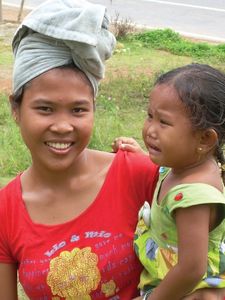 The Rawas are a people group of South Sumatra. Those who live near the Rupit River are also known as the Rupit, while those who live near the Rawas River are most commonly known as the Rawas. They live in the Musi Rawas regency of South Sumatra province. Many Rawas people live in small cities or villages. In the west, the Rawas territory ascends to the peaks of the 2,068-meter-high Mount Hijau. To the south is the Musi Rawas regency capital, Lubuk Linggau, through which runs the trans-Sumatra highway. The Rawas language is a branch of the Malay language cluster.
The Rawas are a people group of South Sumatra. Those who live near the Rupit River are also known as the Rupit, while those who live near the Rawas River are most commonly known as the Rawas. They live in the Musi Rawas regency of South Sumatra province. Many Rawas people live in small cities or villages. In the west, the Rawas territory ascends to the peaks of the 2,068-meter-high Mount Hijau. To the south is the Musi Rawas regency capital, Lubuk Linggau, through which runs the trans-Sumatra highway. The Rawas language is a branch of the Malay language cluster.
What are their lives like?
The main sources of income for the Rawas come from rubber and palm oil plantations. They are self-sufficient in producing their food supply. The Rawas area also produces various fruits such as oranges, mango, papaya, and durian. They also raise livestock such as ducks, goats, and water buffalo. When catching fish, the Rawas still use traditional boats without motors.
The Rawas are highly motivated in pursuing their economic needs and many work until they are old. The Rawas strongly value honesty in their work, and this can be seen in how they earn their money. Honesty is a community value and therefore the Rawas area is quite safe. Their relationships with the transmigrants in their area are very good.
The line of descent is bilateral, which means that a child may choose his line of descent, or it can be decided through discussion with his parents before they are married. There is a clear division of work between men and women. Men work in the fields, plantations, rivers, or in making bricks. The women cook and care for the children at home or run small shops.
The Rawas have interesting art forms. Their art forms include singing and traditional dancing with tambourines, like the Tari Piring (Plate Dance) and the Tari Pisau (Knife Dance). Art groups are formed among the young people encouraging these traditional arts of dancing and singing. The Rawas are also active in developing pencak silat (Indonesian martial arts).
What are their beliefs?
The Rawas embrace Sunni Islam. They obediently and joyfully perform the religious duties of fasting and other Islamic celebrations. One of these celebrations includes the circumcision of boys aged six or seven years old. They also hold religious meals to remember the deceased at 7 days, 40 days, and 100 days after a death. They often use an object which is carved or engraved with Islamic designs as a charm when they bury their dead.
What are their needs?
They seem to have sufficient income from their rubber plantations. However, at this time they need medicine for treating malaria as it is often a cause of suffering for them. In agriculture, they need help with improving the quality of their fruit. The rich flora in this area, especially with the wide variety of trees, has great potential for expansion to become a highly valuable economic commodity.
Leave a Reply